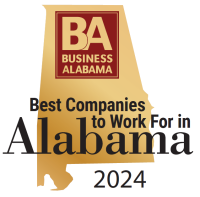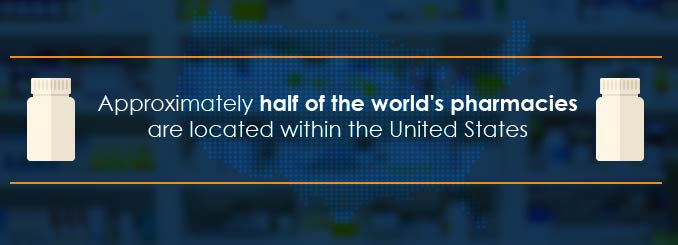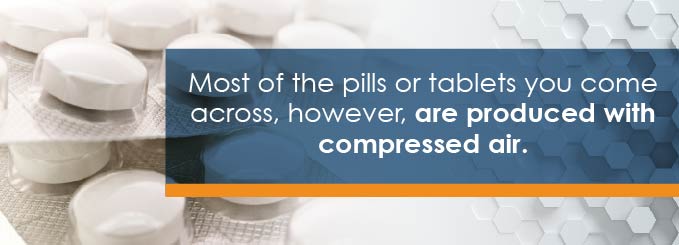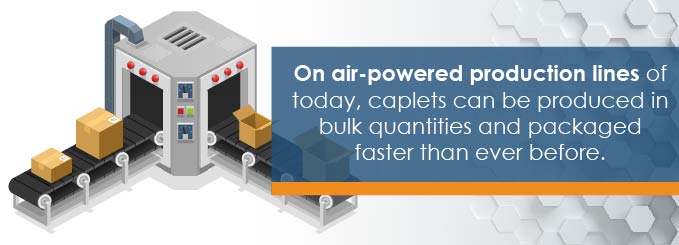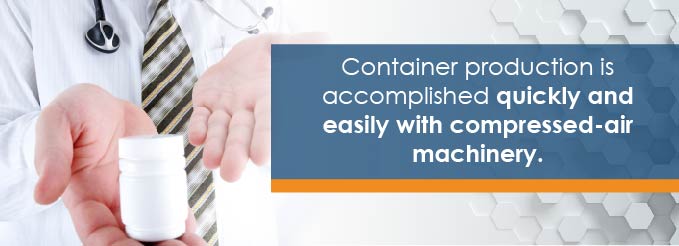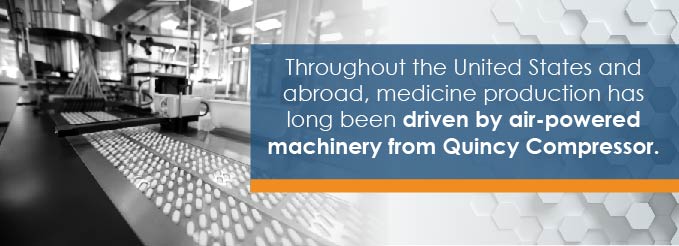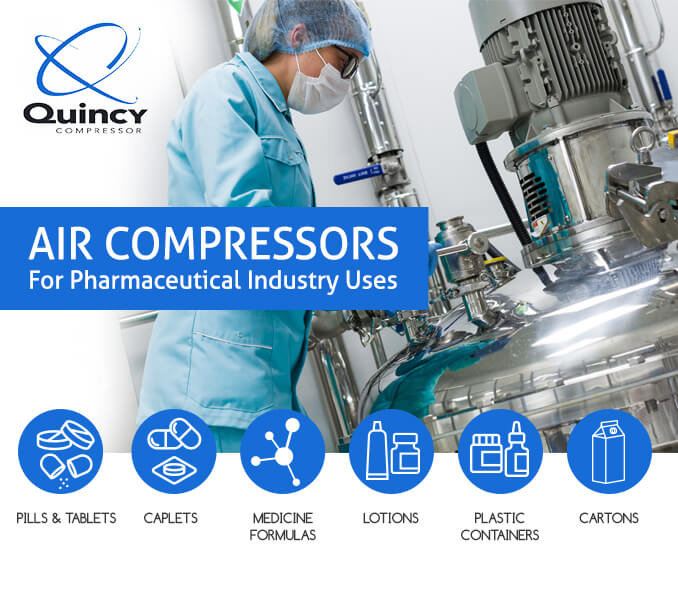
Approximately half of the world’s pharmacies are located within the United States. For the Food and Drug Administration (FDA), this amounts to a lot of work in terms of regulating an industry that plays a crucial role in the health and well-being of millions of patients. As the population grows, the industry must continually expand to accommodate the rising number of patients in need of medication each year.
In order to facilitate these developments, pharmacies have become increasingly reliant in compressed air for everything from equipment operation to medicine production.
Air Compressor for Pharmaceutical Industry Uses
The production of medicine requires machinery that can make formulas and bottle them in liquid and pill form. From the mixing of ingredients to the labeling of bottles, every step must be implemented exactly as detailed in the formula for a given medicine. In order for pharmacies to recoup their costs and stay on top of market demand, it’s crucial that all the steps in each production be carried out quickly with the utmost efficiency. Most importantly of all, each medicine must be produced in an environment that’s free of germs, bacteria and contaminating oils.
The aforementioned can all be accomplished with an air compressor for pharmaceutical plant productions. The following steps in medicine making are among the areas where pharmacies most benefit from the use of air compressors.
| QSI | Cool Dryer |
| QGV | QPNC |
| QGD | QED |
| QGS | QPVS |
| QGDV | QCMD |
| QGSV | QHP |
| QOF | QHD |
| QOFT | QBP |
| PPNG (PSA N2 Generator) |
Pills and Tablets
At pharmacies and drug stores, shelves are stocked with various types of medicines that are made to remedy an assortment of health conditions. From headache remedies to cold medicines, the majority of these products are usually offered in pill or tablet form. Some people prefer the rounded pill, while others are more comfortable with longer tablets, but the effects of a given medicine are always the same, regardless of its shape.
Most of the pills or tablets you come across, however, are produced with compressed air, which is responsible for the following steps in the process of formation:
- Mixing: With any type of tablet, ingredients must be balanced according to the exact formulation of the particular medication. In pharmaceutical labs, pneumatic tools can portion each ingredient exactly as specified.
- Hardening: Once the ingredients in a bulk production of medicine have been mixed, the contents must be portioned, shaped and hardened into tablet form. Throughout this whole process, compressed air machinery performs each step to perfection.
- Coating: After the pills are molded and solidified into shape, the next step involves coating them with a marketable texture or color. With pneumatic tools, the processes of coloring and coating can be accomplished flawlessly, without a hitch.
Hard medicines allow people to overcome a range of bodily pains, joint discomforts, throat irritations and symptoms involving colds, headaches and flus — but few of these medicines would be available as you see them on today’s market without the mixing, hardening and coating functions that are driven in laboratories by air-powered tools and machines.
Caplets
Not everyone is comfortable or even capable of swallowing hard forms of medicine, like pills or tablets. For these people, softer alternatives are manufactured in the form of caplets, in which powdery medicine formulas are contained by gelatin membranes. In this form, the medicine is softer on the mouth and can generally pass more easily down the throat with water.
Caplets are all made possible by the magic that occurs in pharmaceutical labs, where air compressors make the following things materialize:
- Contents: Contained within each gel cap are powders that comprise the medicinal content of a given caplet type. Whether it’s a caplet for headaches, indigestion or sinus symptoms, the powdery contents are mixed in a lab on equipment powered by air compressors.
- Gels: The dry gel that holds each caplet into form is also a marvel of lab capabilities, since it consists of ingredients that have to be mixed to an exact balance, spread to a certain thinness and dried to a particular consistency. With compressed air, all these steps are accomplished quickly and easily.
- Packaging: In order for gel caps to be sold in pharmacies or over the counter, they need to be packaged in a manner that protects their delicate texture. Some brands sell caplets in medicine bottles, whereas other caplets are sold in blister packets. Either way, much care goes into the packaging of caplets, and compressed air technology makes this possible.
The production of caplets has long been one of the great innovations of the pharmaceutical industry. On the air-powered production lines of today, caplets can be produced in bulk quantities and packaged a whole lot faster than ever before. With compressed air, the entire process meets sanitation and environmental standards with flying colors.
Medicine Formulas
The production of medicinal fluids requires just as much technology as that which goes into the making of pills, tablets and caplets. While there’s no hardening or coating involved in the making of eye drops or cough syrup, the ingredients must still be measured to the specifications of a given formula. The environment in which such products are made must also be free of impurities. Finally, the amounts must be evenly portioned for over-the-counter consumption.
When it comes to medicinal formula production, compressed-air systems allow pharmaceuticals to handle the following steps with utmost ease:
- Balancing: Each medicine is formulated to have a specific effect, whether it’s ingested or applied externally. The intended benefits cannot be gained, however, without the proper balance of ingredients. Today’s pharmaceutical labs use compressor-driven tools to ensure that the exact balance of ingredients is added to each specific formula.
- Purification: Before a formula can be put on the market for human use, it must be pure and free of contaminants. With oil-free compressed air, medicines are formulated without the contaminating elements of oil and other germs.
- Portioning. In order for each customer to get his or her money’s worth, each container of a given medicine must include the exact same amount of the pills or formula in question. With air-powered machinery, pills are counted and formulas are measured to the exact ounce.
During the production of medicinal fluids, it’s crucial that all steps be carried out in environments that are free of moisture, airborne oil, moldy bacteria and other germ-causing agents. When each step is carried out with an air compressor for pharmaceutical purposes, none of the aforementioned elements will enter into the finished products.
Lotions
For medicines that are made for external application, the stakes of formulation are critical. Though the effects on the body are meant to be physical rather than physiological, the balance of ingredients can make all the difference in whether a given lotion causes comfort, irritation or no effect at all. Therefore, the following steps must be carried out without fail during each lotion production, and this is best accomplished in pharmaceutical labs that are powered by air compressors:
- Formulation: Skin products must first be tested for their effects, and then balanced with the right ingredients for the best possible results. With pneumatic-powered tools and machinery, labs can test and ultimately determine the right formulations to remedy skin conditions.
- Combination: The slightest imbalance of chemicals could cause a fluid or lotion to either lose its intended effect or cause adverse reactions on the part of users. Thanks to the capabilities afforded by air compressors, pharmaceutical labs are guaranteed a perfectly balanced mixture with each product.
- Distribution: Once a lotion has been mixed for mass production, it must be distributed in proper measurements in uniform containers along the assembly line. Compressed-air systems allow operators to fill each container exactly as specified on the pneumatically applied labels of a given product.
Skin formulas must be made with all the same care and sanitation that goes into the production of pills, tablets, caplets and fluid medicines. Therefore, formulas intended for external use are most safely and efficiently produced in labs that use pneumatic machinery — specifically, the kind that meets today’s pharmaceutical compressed-air requirements.
Plastic Containers
Medicines are sold in a variety of containers, each of which is suited to the size and type of medicine in question. In most cases, however, pills and liquid medicines are sold in small or tiny plastic bottles. For many medicines, the bottles used are simply generic, standard-issue containers that can be ordered by size, in bulk, from production facilities. Sometimes, containers are made especially for a specific medicine brand.
Either way, the following steps are involved in container production, and each is accomplished quickly and easily with compressed-air machinery.
- Molding: The containers in which medicines are sold must be molded to specific sizes to suit the amounts contained with a given product. The shapes and colors of product containers also matter, because this can play a significant role in a medicine company’s marketing identity.
- Hardening: Once the hot plastics have been molded into shape, they must be dried within an environment that’s free of contaminants. With pneumatic machinery, the containers are hardened with the utmost sanitation and are therefore safe for pills, caplets, lotions and liquid medicines.
- Labeling: After the containers are made, but before the medicine is added, labels must be applied to the front and back that identify the brand, the medicine type, the ingredients and the recommended dosages. Whether the labeling is generic or fancy, air compressors give assembly machines the ability to apply each label in a reliable and uniform manner.
Plastic containers serve as protective barriers that keep pills, caplets and liquid medicines fresh and shielded from the elements. As such, it’s crucial that medicine bottles be produced on machinery that makes them sanitary and foolproof. Such qualities are best achieved on production lines where each application is powered by an air compressor.
Cartons
While the majority of medicines are contained in plastic bottles, some are packaged in cartons. For over-the-counter medications, cartons make medicines tamper-proof and harder to steal. From a marketing standpoint, cartons help with brand recognition by serving as platforms for the logos, designs and colors that might be associated with a particular product.
Medicine cartons generally range from palm-sized to slightly larger, but their production consists of the following steps, each of which is best achieved on air-powered production lines.
- Cutting/folding: Cardboard must be cut to the size requirements of each particular medicine product, and the cutouts must then be folded according to the specifications of the corresponding design. With air-powered machines along assembly lines, carton production is an easy task for the pharmaceutical industry.
- Printing: Cartons must be printed with all the same information that would go on a bottle. However, the printing of cartons might involve more color and graphic design elements, which help to distinguish medicine brands from others on the market. Carton labels can be printed by the second with the use of industrial air compressors.
- Packaging: After the cartons have been fully assembled, it’s time for the medicine to be sealed inside. Generally, medicines sold in cartons will be contained either in bottles or blister packs. At this point, the medicine in question has been labeled, packaged, and is now ready for sale as either a prescription or over-the-counter drug.
Despite the fact that most medicines are sold in bottles, cartons are also a crucial element of product protection. The importance of cartons especially holds for caplets and liquid medicines, which could otherwise be tampered with or poisoned in advance of reaching customers. Therefore, it’s important that medicine cartons be pneumatically sealed for proof of safety before they hit the shelves.
Quincy: Makers of Air Compressors for Pharmaceutical Plants
At pharmaceutical plants throughout the United States and abroad, medicine production has long been driven by air-powered machinery from Quincy Compressor. As one of the world’s leading manufacturers of air compressors, pneumatic tools and system components, Quincy-brand machinery has been responsible for the production of medicinal products that are prescribed by pharmacies and sold at drug stores domestically and internationally.
For almost a century, Quincy has been a constant innovator in compressed-air technology. Our machines have driven production lines in the automotive, construction, consumer goods and pharmaceutical sectors. As such, Quincy air compressors have helped to improve lives by contributing to the availability of cars, housing, foods and medicine.
Over the last few decades, the bar has been raised in terms of what the public expects in the products they buy and consume. When it comes to something as vital as medicine, people want more than just good products — they want medicines that are free of unhealthy agents but good for the environment. On that front, Quincy has been a trailblazer by developing some of the most power-efficient air compressors on the market.
As the pharmaceutical industry continues to expand, the expectations that surround medicine production are bound to get more intense. In order to stay on top of these developments, it’s important to have production facilities that are equipped with the kinds of machines that can turn out products quickly and efficiently. To learn about more ways that Quincy air compressors can transform your operations, check out our sales and services page right now.

